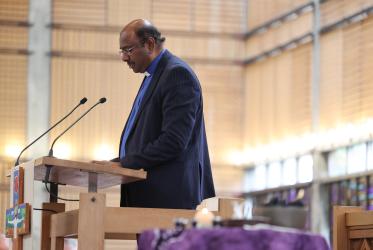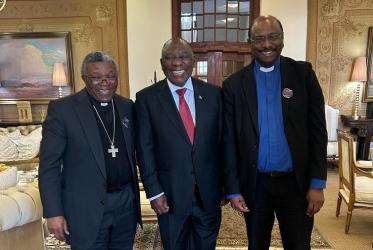Memorial ceremony for Nelson Mandela (1918-2013)
Chapel of the Ecumenical Centre, Geneva
Opening statement by the WCC general secretary, Rev. Dr Olav Fykse Tveit
Your Excellency, Ambassador Minthy of South Africa.
Moderator of the WCC Central Committee, Dr Agnes Aboum.
Your Excellencies, honoured guests, dear colleagues, friends, sisters and brothers.
It is good that we are here together this morning. We have something in common. Today we are all living after Mandela Some of you have known him, lived and worked with him. Some of us have met him, seen him, listened to him. Many of us have read about him or what he has said or written himself. None of us can be like him. All of us can honour him. All of us can learn from him.
Today, we are gathered in the Ecumenical Centre after Mandela, after his life and his death. His journey ended yesterday, where it began 95 years ago, in his home village, Qunu. We are gathered here to give thanks to God almighty, the God of life for the gift of Nelson Mandela.
Today we pray for eternal rest for his soul, and that his memory will be for ever a blessing, an inspiration and a challenge for all of us.
Many years of his life, he described in his autobiography, as the «Long Walk to Freedom». No book has nurtured my critical sentiments to humanity more than that: How can we humans treat one another, a whole people like that, so consequently discriminating and humiliating?
However, the book also challenged my critical sentiments about humanity: How can a human being survive and keep hoping under such circumstances? More than that: how can the best attitudes and values for leadership mature and develop in the one of the most extreme systems of oppression that was his prison, Robben Island?
Mandela has helped us to see the worst and the best in humanity. He has helped us to be realistic. Even more important: He has helped us to still believe in the one humanity. He has helped us to love the one humanity.
He has taught us that this love implies that there have to be structures of mutual accountability, rule of law, freedom and democracy with equal opportunity for all. He has taught us that sometimes we have to fight to make that love of humanity real, and to be resilient in our fight. Even more, he has taught us that whatever we do for justice and peace, the life and the dignity of each human have to be respected and protected.
A liberated South Africa could therefore also celebrate, as the South Africans deeply mourned that he is gone now. I was honoured to be able to participate on behalf of the World Council of Churches and the ecumenical family in some of the events on his final journey in Johannesburg this last week.
I was invited to pray with family and friends in one of the daily evening prayers at Mandela´s home in Houghton. When I was given the opportunity there, and later in interviews with several radio stations, I shared how Mandela´s fight became a great concern and a focus in the Program to Combat Racism of the World Council of Churches since 1969. I could share how many other actors in the ecumenical movement committed themselves to participate in this struggle, as a matter of confession of faith to God of life, the creator of the one human family. Many of these partners are represented here in Geneva and in this ceremony.
I could also share how churches are filled these days all over the world, to pray for the family, for South Africa, and at this particular moment, singing the songs we learned through your struggle which will sing also today; songs that still move our hearts.
Furthermore, I could share how Mandela empowered us and many others by the way he spoke to us when he came here in the Ecumenical Centre shortly after his release in 1990, and later in the 8th Assembly in Harare in 1998.
He told us that without the work of the churches worldwide, he would not be a free man. The positions the churches took against apartheid, also against the theology behind apartheid, declaring it a sin, became a solid point of reference and hope for the struggle. Together with many others, we could make our contribution, and it was confirmed as significant.
The next day I represented the WCC in the Memorial Service in the great FNB soccer stadium in Johannesburg, feeling the deep gratitude of all his people to him. In a remarkable way, Mandela gathered the whole world to celebrate the best and shared values of human beings, also in the moment of his death. This was a miracle in itself, a new sign of hope he gave to the world.
Today, we continue after Mandela, and the question to us is what Archbishop Desmond Tutu asked the whole crowd and the leaders of the world at the end of the service last Tuesday: “Do you commit yourself to the values of Nelson Mandela?”
The best way to honour him is not only to answer «yes» to Tutu as a custodian of the moral legacy of Mandela, but to now go and do it ourselves.
Therefore, after Mandela, we are inspired and challenged. As church representatives, we are inspired to believe even stronger in our values. But we are even more challenged to critically ask how do we really implement them in the daily life of those who need us?
As human beings, as representatives and leaders mandated to contribute to the common good, we are challenged to continue Mandela´s journey.
Let it be a pilgrimage of justice and peace.



